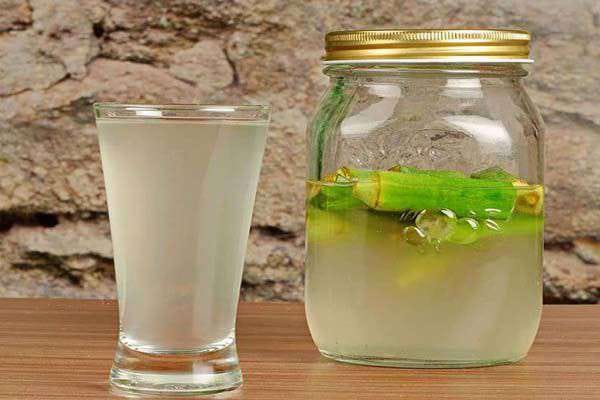Several posts on social media have claimed that drinking okra water boosts female fertility.
Okra water, according to these posts, refers to chopped-up bits of the flowering plant with edible green seed pods, steeped in water.
The vegetable which is known for its slimy nature, due to the mucilage it contains, is a popular delicacy in Africa, particularly in West and Central African countries.
Aside from being consumed as food, some social media users claim that it can be used as a fertility supplement.
Advertisement
In a video posted on Facebook, a pregnant woman showed how she prepared the solution for an “easier delivery” and “all-natural birth”.
In the video, the woman chopped okra into jars of water, sealed them with plastic wrap, and recommended storing them in a refrigerator for 24 hours, after which she drained the vegetables from the water and added fruits for flavour.
Advertisement
“Hi ladies, I came across this… and I was told it helps boost ovulation in women who are trying to get pregnant when you drink it. Please I will advise some women to try it,” said another Facebook post.
Replying to the comment, a Facebook user said: “Yes it’s a natural way of boosting ovulation, it [is] very good for a lady trying to conceive.”
The commenter went on to say that it “boosts ovulation”, adding that “it’s good to take every morning beginning from the first day your period stops”.
The video has racked up 944 views, 59 likes, and nine comments while the second post was published in a public group that has over 427,000 members. The post has 419 comments, 411 likes, and nine shares so far.
Advertisement
OVULATION AND PREGNANCY
Ovulation happens when a mature egg is released from one of the ovaries during a woman’s menstrual cycle.
The egg then travels down the fallopian tubes and the womb prepares for implantation of a developing embryo. Pregnancy occurs when the egg is successfully fertilised by the sperm.
During pregnancy, women are encouraged to increase the uptake of certain nutrients like protein, iron, folic acid, iodine, and choline. It’s also important to get enough calcium, vitamin D, potassium, and fibre.
Advertisement
VERIFYING THE CLAIMS ABOUT OKRA WATER
To understand the composition of okra, TheCable consulted Elizabeth Kembe, a professor of home economics in the College of Food Science and Human Ecology at the University of Agriculture, Makurdi, Benue.
Advertisement
Kembe said the vegetable is a functional food that has been shown to contain minerals, vitamins, and antioxidants, but said there has been no proof of impacting sexual health.
“Vegetables have specific roles they play. Some are good for the skin, some are good for sleep, and food bowel movements. But relating okra to one’s sexual health, I have not come across that kind of scientific discourse,” she said.
Advertisement
“We know it’s a healthy vegetable that has nutrients that help the body… one’s sexual and reproductive health is a different matter entirely.”
A study published in the United States National Library of Medicine showed that okra is a nutrient-rich food and its inclusion in one’s diet can bring many benefits including dietary fibres, carbohydrates, proteins, and high levels of minerals.
Advertisement
Due to its composition, the study said the vegetable has a potential antidiabetic role to play in medicine.
There was no mention of a link to sexual and reproductive health.
Speaking with TheCable, Mohammed Bukar, a professor of obstetrics and gynaecology in the College of Medical Sciences, University of Maiduguri, described the claims of okra improving women’s fertility and easing labour as a “scientific fallacy”.
“There are ways to evaluate claims. This issue, to my knowledge, has not been studied anywhere,” he said.
“Only when there’s a study on this that has gone through all the scientific procedures and has been validated elsewhere that one can make such a statement.”
VERDICT
The claims that okra boosts fertility and eases labour are unproven. There is no scientific evidence to support the claim. Experts advise that women who seek antenatal support should see a gynaecologist.
Add a comment






